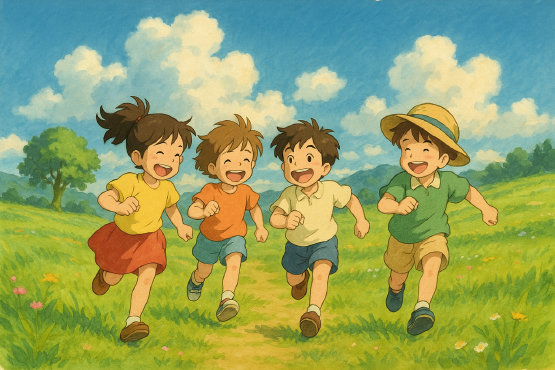Before children say 'I'm sorry'
The first words at the children's sports day.
At an elementary school sports day, before the children even started running, one cautiously said, 'I'm sorry.' This phrase was not merely an expression of politeness. In that brief moment, we see how today's society has instilled hidden expectations and unspoken norms in children.
Changing Norms of Modern Society
Modern society is changing rapidly. While a culture that respects diversity and creativity is spreading, the unseen regulations and pressures are becoming even more sophisticated. If children have to 'apologize' for something before they can freely laugh, run, and express their emotions, aren't we limiting the naturalness of their growth in some way?
The normalization of "I'm sorry"
The phenomenon of the phrase "I apologize" becoming overly normalized is not just a simple linguistic habit. It reveals that children are internalizing the fear of making mistakes, the pressure of others' gaze, and the "model behavior" that the adult world expects far too early. The culture of apology created in this way sometimes functions as a language for evading responsibility and at other times serves as the starting point for self-denial. Children bow their heads not because they have done something wrong, but out of anxiety that they might have done something wrong. As a result, their self-esteem gradually diminishes, and their emotional expressions become increasingly cautious.
Social Pressure and Children's Development
Behind this culture lies our society's excessive sensitivity and regulation-centered perspective. Under the names of complaints, safety, and order, children's daily lives are unconsciously controlled, and they gradually become smaller and more cautious beings. In such an environment, it is difficult for autonomy, creativity, and emotional diversity to thrive. The result is all too predictable: a child who only seeks the 'right answer,' a child who fears mistakes, a child who is overly conscious of others' opinions. Ultimately, they grow into adults who struggle to express themselves.
The true meaning of 'I'm sorry'
Therefore, we must now listen carefully to the profound resonance contained in the small phrase 'I'm sorry.' We need to reflect on what this phrase truly means and recognize that it is not merely a matter of etiquette, but a reflection of the social structure.
Proper Education of Responsibility and Consideration
We must teach children the right sense of responsibility and consideration. However, this does not come from 'unconditional apologies'. Responsibility stems from the ability to understand emotions and situations, and to make appropriate choices accordingly. Insincere apologies lead to evasion of responsibility and loss of self-agency. Conversely, the process of understanding and regulating emotions, and learning to respect oneself within relationships with others, serves as the foundation for developing true responsibility and empathy.
The necessity of an unrestricted educational environment
In order to achieve this, education and the environment must change above all else. Schools should focus on cultivating emotional intelligence and empathy, and families and communities should provide a safe haven where children can feel it’s okay to make mistakes. We need to create an environment where warm words like 'thank you,' 'it's okay,' and 'I'll help you' can take root in daily life, by providing a variety of experiences that express emotions.
Changes that Respect Children's Voices
Additionally, structural changes are needed to help children express their voices freely. An environment must be created where they can present their opinions, engage in discussions, and critique. Only then can children openly share their feelings and build healthy relationships with others through sincere communication.
Responsibility for Future Generations
The future lies in the hands of these children. If they learn to understand their emotions, express them, and respect others, we can期待 a warmer and more inclusive society. They will believe in themselves, learn to live in harmony with the world, and practice a true sense of 'responsibility'.
A world where children can grow up comfortably
What we need to do now is to create a world where children don't have to say 'I'm sorry' before they just run. A world where it's okay to make mistakes, where it's safe to speak up, and where expressing emotions is welcomed. In that place, children will be able to grow into their true selves.

Post a Comment